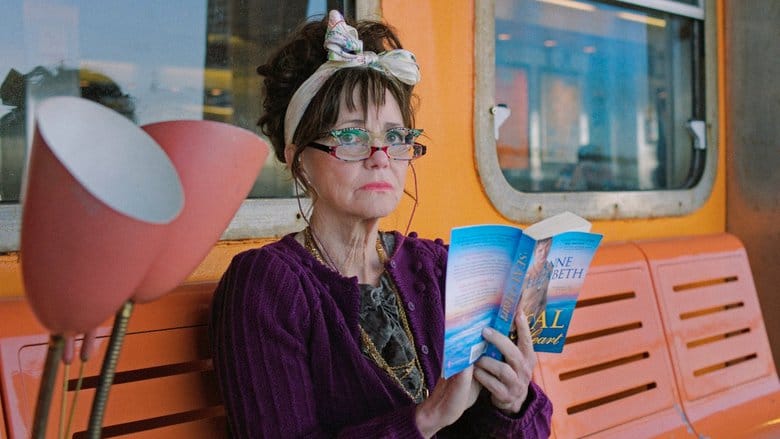This has been a year of bombast at the movies. Super-hyped movies like “Deadpool” and “Batman vs. Superman” crush the box office with enormous openings, while thoughtful movies like “Whiskey Tango Foxtrot” or “Eddie the Eagle” have been tossed in the dustbin of movie memories while barely registering on most filmgoers’ radar.
That’s why it’s so refreshing to see a film like “Hello My Name Is Doris” catching on as a sleeper hit. Starring Sally Field in one of those roles that is a perfect match of talent and writing, it’s a refreshing showcase (and a likely Oscar nomination) for one of our most beloved actresses and one of the most thoroughly delightful films to come out in years. Don’t be fooled thinking it’s just for old folks, because this movie is the very definition of Dateworthy.
“Doris” follows a woman named Doris Miller (Sally Field), who is in her 60s when her elderly mother finally dies, freeing her from years of responsibility taking care of her at the expense of pursuing her own dreams and relationships. Doris has had the same job for decades, working data entry from a cubicle at a faceless corporation in Manhattan, which she travels to by two subway trains and a ferry each day.
Just as she is freed from her daily duties for her mother, Doris is under pressure from her brother (Stephen Root) and his wife (Wendi McLendon-Covey) to sell the home she has spent her entire life in. Doris has been a hoarder for decades, and she is extremely reluctant to leave the comfort zone of a house filled with the cluttered memories of yesterdays.
Everything turns upside down for her when she has an awkward meeting in a crowded elevator with a new twentysomething executive named John Fremont (Max Greenfield). With her imagination running wild after decades in repression, Doris suddenly starts wearing colorful outfits and engaging in outlandish Walter Mitty-style daydreams about this new dreamboat.
It all seems pointless until the 13-year-old granddaughter of her best friend Roz (a hilarious Tyne Daly) helps Doris find John on Facebook and gives her inside scoop on his likes and dislikes. Creating a false persona to “friend” him and conduct thorough intelligence, things soon get complicated even as John welcomes Doris to immerse herself into his vibrant social life.
Dishing all those plot points only scratches the surface of the joys to be found in this warm, witty and humane character-driven film. Co-writer/director Michael Showalter was one of the members of the cult favorite sketch comedy troupe The State in the 1990s and has spent the years since crafting one criminally underappreciated comic gem after another (see “The Baxter” and “They Came Together” – you’ll thank me).
Here, he teams with a young writer named Laura Terruso (who created the character of Doris for an acclaimed 2011 short called “Doris and the Intern”) to write the kind of film that gifted actors are almost dying to get into. The supporting cast here is unbelievably deep, also featuring veteran indie screen darling Natasha Lyonne, Kyle Mooney of “SNL,” Beth Behrs of CBS’ hit sitcom “2 Broke Girls,” “Silicon Valley” star Kumail Nanjiani and the ubiquitously unctuous Peter Gallagher in addition to the actors listed above. When quality actors like these line up ten deep for even a couple of lines in a movie, you know the script is something special.
What makes this movie magic isn’t just its unique comic sensibility and sunny disposition – a trait that’s all too rare in movies these days – but its ability to surprise viewers at key moments with the flip side of Doris’ optimistic surface. Field expertly plays a woman who has harbored pain and disappointment for decades, and as she and John open up to each other about their respective hurts, viewers are drawn in to truly caring about them as well.
There are only two minor criticisms I can think of for “Doris,” but they were both audibly expressed by other audience members at the crowded Tuesday matinee I attended. First, this is such a sweet and good-hearted movie, and Field’s core audience is generally older and less given to edgy humor, that it’s a shame when characters lapse into a fusillade of comic profanity in a couple of scenes.
It seems that Showalter and Terruso are making a subtle comment about how thoughtlessly crude the twentysomething generation can be in trying to carry on even basic conversations. These moments are jarring nonetheless and pointlessly give a movie that could easily be a great family film an R rating, which is certain to also limit the older audience for whom the film is a slam dunk entertainment. The scenes are in one cluster of the film, however, and easily forgiven by the end of the movie.
The other issue is the film’s final shot, which leaves viewers with total ambiguity after investing themselves in this wonderful woman’s life for 95 minutes. Does she find love and happiness, or doesn’t she? It’s momentarily maddening to wonder about that fact, but in its own way, leaving viewers with an ending that will engage their own imaginations may just be one more moment of this movie’s magic. I can’t recommend “Doris” highly enough.



